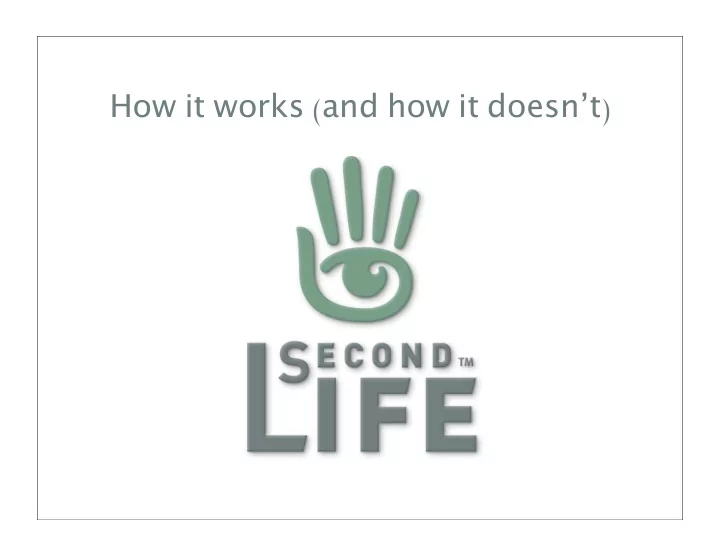

How it works ( and how it doesn’t )
What is Second Life? (It’s like first life, but you can fly.)
You can make your own stuff…
…and write your own software...
... so it’s certainly not a game (or a “site”). World Avatar Game
Collaborative creativity is the killer app...
...but what do people DO in Second Life?
Grey goo! Robot picture goes here
Cut a hole in the world to stop the goo Grey goo Firebreak
One server re-compile later: (We’ve subsequently installed space lasers and replication fences)
Back to our regularly scheduled program... 22
2007 SL is pretty big 2003 2005 2006 15,400 simulator processes 956 square kilometers = 8X San Francisco ~100 TB (over 1bn files) of user-created content 30 million concurrent scripts
How it works, today and tomorrow
SL (the software) has two primary components: Viewer and Simulator A Linden Lab server A user’s PC
The simulator • Monolithic C++ application • Linux • 15,400 concurrent sims • Fixed 256m x 256m size • Havok Physics • LSL Scripting • Visibility Calculation • Scene compression and streaming • Closed source
The viewer • Monolithic C++ application • Windows, Mac OS X, Linux • 50,000 concurrent viewers • Creation tools built-in • No client scripting • No plugins • Open source! BTW: go download the code!
A simple plan
...with global data
...and permanent storage
...and external communicatons
...and it needs to scale
...so not really simple, OR a plan
Legacy components
Time to modernize
(Ponder...)
SL is a World filled with Avatars
These could be self-contained units
For a larger scale
Toward a global platform
Second Life is a huge success, and the more people use it, the more interesting it gets. What you can do and be and create in this virtual world is limited only by SL technology, so we will never stop improving that technology. At the same time, we recognize that SL cannot truly succeed as long as one company controls the grid, so we must work toward opening the platform. All of which is to say: we’re only just getting started.
a tiny aside The Second Life software is built and maintained by a 50-person developer team. The Second Life infrastructure is built and maintained by a 12-person operations team. lindenlab.com/employment Poster and image by Michael Henderson
Questions? Ian Wilkes ian@lindenlab.com
Recommend
More recommend